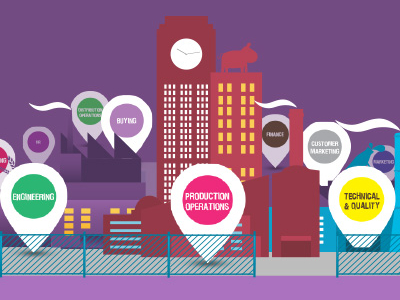What’s it all about then?
As a PR Manager specialising in food and drink you could be working as part of a client account team in an external agency that concentrates on the industry or within an in-house department of a major food manufacturer and food brand owner.
If you work as PR Manager within a small or medium-sized business, you may work alone or with a very small team and be totally responsible for all public relations and external communications activity – and often be called on to use your communication expertise to assist in internal communications.
This will probably include devising and undertaking PR that directly supports sales drives and marketing activity as well as PR focussed on enhancing and protecting corporate reputation and the corporate brand.
In a larger business, you may be more specialised – working as part of a larger PR, marketing or corporate communications team spanning areas like Media Relations, Public Affairs, Events, City & Financial PR, Digital Media etc and even acting much like an external PR Account Manager handling the PR needs of internal departments, brand teams or site locations or regions as ‘internal clients’
The general rule is the smaller the organisation, the wider your remit and the more opportunity you’ll get to use all of your PR knowledge and skills across a wide range of marketing communications, corporate reputation and customer relations challenges.
What might I be doing?
Your primary role will be to assist the company, its brands and its products to be known and admired by stakeholder groups such as end customers, key trade clients including supermarkets, wholesalers or food service organisations, trade media, investors, staff and prospective employees.
In most firms, you’ll handle every tool in the PR box to communicate with these groups – from channels such as an informative company website to online and print media news releases, social media campaigns, events, printed collateral and exhibitions.
As PR Manager, you can expect a very varied working day. You’ll often be working hands-on writing news releases, briefing key media contacts or organising events. You may work with an external agency – in which case you’ll spend more time on communications planning and strategy aligned to the company business plan, budgeting and briefing the agency and ensuring they deliver the results you are after.
To carry out your work effectively, you’ll need a deep understanding of what your business is out to achieve and how well it is progressing – which means you’ll be a great networker staying as close to the challenges in production as to the plans of the MD and Board and the latest client opinions and marketplace and consumer trends.
While most PR managers will try to stick to planned activity, the reality of the job is that you can always expect the unexpected. You may have to deal with sudden media concerns about an ingredient you’ve used for years or a social media flurry that’s linked your product to the latest Hollywood Blockbuster.
In every case, it’s your job to make the most of every opportunity to get good news across and promote positive opinion of your company and its products.
What will be expected of me?
As PR Manager, it will usually be your responsibility to plan campaigns and secure the necessary budget to undertake them from your Marketing or Sales Director, MD or Board.
Your PR activity will be expected to contribute to the commercial success of your company so it’s important to use communication measurement and targets that have firm links to sales performance and customer sentiment even if indirect.
The growth of digital and social media, where impacts and interactions can be more easily measured and analysed, has made online PR ever more important.
You’ll need to be an outgoing and confident person with excellent influencing and listening skills and capable of planning and managing your own workload and coping with pressure. You’ll be able to resolve any negative media issues in a prompt and satisfactory manner in order to protect the long-term interests of your company and brands while maintaining your positive relationships with industry commentators.
What can I expect?
Done well, the role of PR manager can result in great job satisfaction. As a key company contact, you’ll have a high profile both within the organisation and externally.
If you are working in an agency, you can expect to work long hours – but usually with less office politics, fewer internal meetings not directly connected with communications and more chance to be creative.
Internally, you will have far more control of your day-to-day work, enjoy greater job security and regular hours and contribute to wider business activity and strategy.
Ether way, you’ll love what you do and grow to love it more as your skills and experience earn the respect of colleagues and clients at every level.
What qualifications do I need to get in?
A PR Manager will usually be expected to have a degree in a related subject plus several years’ experience during which they will have attended professional development courses.
While many people now enter PR via a PR or Media Studies degree, a degree in English, Business, or Marketing is often more attractive. A good course will offer industry placements. If yours doesn’t, make sure you arrange your own around your studies. PR is highly competitive and good work experience counts.
Being confident, having a nose for news, establishing good relationships with people at all levels, being articulate and having strong writing skills are the basis for this role – as is excellent general knowledge and an interest in everything from the business pages to celebrity culture.
Most people start in PR at as a PR Executive and work up to become PR Manager as their experience and track record of achievement grows.
What about further training?
You could look at postgraduate professional courses in marketing and communications from organisations such as the Chartered Institute of Public Relations (CARP) or Chartered Institute of Marketing.
Anything else I might need to know?
Yes – start now. Write a blog. Curate a great You Tube channel. Keep up to date with the latest mobile communication trends. Read the news every day.
Also job names are flexible in PR. As a PR Manager you may be expected to undertake a Head of PR role and run a department or team or you could be a team member with far less responsibility. Take a close look at the salary and job description if you want to know where you are in the pecking order and what kind of job pressures you may have to face.
With enough relevant experience, there is always the opportunity for career and pay progression as a PR Manager. You could progress to the role of PR Director, or Head of PR, marketing manager or brand director - all of which involve making decisions about sales and marketing strategies, supervising staff and agencies and delegating tasks to other members of the team.
The skills required of a PR manager are extremely transferable and allow employees to move on to many different senior jobs.
 cy
cy





